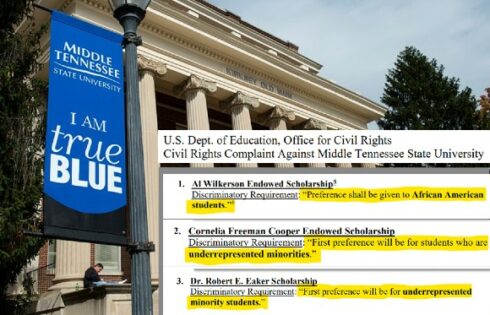
‘The Naval Academy is becoming known not only for banning books, but also for cancelling someone for planning to discuss the banning of books,’ critic said
A controversial move by the U.S. Naval Academy to remove 400 books that promote “diversity, equity, and inclusion” from its library continues to have repercussions, as an expert on Stoicism had his lecture there canceled because he was set to criticize the decision.
Ryan Holiday, who owns The Painted Porch Bookshop in Texas and is a devoted Stoic, has given a lecture for the last four years on the virtues of the philosophy to midshipmen at the academy, but his April 14 talk to the sophomore class on the theme of wisdom was recently canceled because he declined to edit his speech.
“Roughly an hour before my talk was to begin, I received a call: Would I refrain from any mention in my remarks of the recent removal of 381 supposedly controversial books from the Nimitz library on campus? My slides had been sent up the chain of command at the school, which was now, as it was explained to me, extremely worried about reprisals if my talk appeared to flout [President Trump’s executive order banning DEI],” Holiday wrote in an April 19 New York Times op-ed.
“When I declined, my lecture — as well as a planned speech before the Navy football team, with which my books on Stoicism are popular — was canceled.”
A campus spokesperson told the Times that the academy “made a schedule change that aligns with its mission of preparing midshipmen for careers of service […as] an apolitical institution.”
As The College Fix previously reported, following an executive order signed by President Donald Trump in January to remove all DEI policies and practices from federal agencies, academy officials began an initial review to assess the library in late March and flagged approximately 900 books for further examination. Officials ultimately selected nearly 400 to be removed.
A full list of the books removed has been published by the U.S. Navy. The list includes: “How to be an Antiracist” by Ibram X. Kendi; “Uncomfortable Conversations with a Black Man,” by Emmanuel Acho; “American Hate: Survivors Speak Out,” edited by Arjun Singh Sethi; “I know why the Caged Bird Sings,” by Maya Angelou; and “Man & Woman, Boy & Girl: Gender identity from conception to maturity,” by John Money.
Holiday wrote in his Times op-ed the academy is making major missteps.
“Hitler’s ‘Mein Kampf’ was not one of the books removed from the Naval Academy library, and as heinous as that book is, it should be accessible to scholars and students of history. However, this makes the removal of Maya Angelou’s ‘I Know Why the Caged Bird Sings’ inexplicable,” he wrote.
“Whatever one thinks of diversity, equity and inclusion,” he continued, “we are talking about not the writings of external enemies here but, in many cases, art, serious scholarship and legitimate criticism of America’s past.”
“One of the removed books is about Black soldiers in World War II, another is about how women killed in the Holocaust are portrayed, and another is a reimagining of Kafka called ‘The Last White Man.’ No people at any public institution should have to fear losing their job for pushing back on such an obvious overreach, let alone those tasked with defending our freedom. Yet here we are.”
A full video of his planned speech has since been posted online.
This Is The Stoicism Talk The Navy Banned
— @RyanHoliday At The U.S. Naval Academy pic.twitter.com/XqWiWE85cF
— Daily Stoic (@dailystoic) April 23, 2025
Holiday also provided a copy of his planned speech to the Free Press. The part referencing the book removals included:
Today we should consider what Stockdale would think about the news that almost 400 books have been removed from the Naval Academy library. I suspected at first that it was an April Fools’ joke. The idea that the best and brightest stars in the country are seen as too fragile, too easily manipulated, too susceptible to be exposed to works that people don’t like or disagree with.
This transgresses the very ethos, the very purpose of higher education, which is to challenge, which is to open doors, which is to allow you to understand things. And understanding and being familiar with something is not the same as liking or endorsing or embracing it. Because when people tell you you shouldn’t be allowed to read something, you shouldn’t be able to engage with an idea, it is precisely those ideas that intellectually curious people ought to go toward.
Read dangerously. Read curiously. Plunge into unfamiliar territory. Get behind enemy lines, and seek to understand anything and everything, particularly the points of view of the people you disagree with. Steelman rather than strawman. Investigate rather than persecute. This is what Seneca was saying: We must read like a spy in the enemy’s camp.
Both decisions have prompted widespread criticism.
“The Naval Academy is becoming known not only for banning books, but also for cancelling someone for planning to discuss the banning of books. This is a tragic new low,” PEN America posted on its website. “Cancelling a speaker in this manner violates the principles of freedom that higher education in the United States is meant to stand for and sends a disquieting message to future military leaders about how to engage diverse viewpoints, Books are not the enemy; ignorance is the enemy.”
MORE: Naval Academy can consider race in admissions: judge
Like The College Fix on Facebook / Follow us on Twitter






Please join the conversation about our stories on Facebook, Twitter, Instagram, Reddit, MeWe, Rumble, Gab, Minds and Gettr.